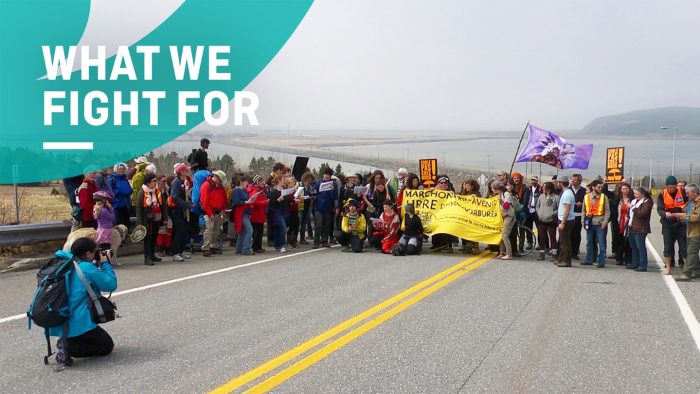
September 28, 2017 – Montreal – National Film Board of Canada (NFB)
Canadians have a reputation for being a polite people. But that doesn’t mean that we back down from a fight. In What We Fight For—the final chapter in the National Film Board of Canada’s 1 Nation. 4 Lenses special programming for the 150th anniversary of Confederation (#Canada150)—the NFB is showcasing the Canadian spirit of protest from past to present.
Here’s to the activists, the advocates and the provocateurs that have taken a stand on everything from Indigenous land claims to discrimination against women and minorities.
In her landmark documentary Kanehsatake: 270 Years of Resistance (1993), the legendary Alanis Obomsawin endured 78 nerve-wracking days and nights filming the armed stand-off between the Mohawks, the Quebec police and the Canadian army in 1990, a confrontation that propelled Indigenous issues in Kanehsatake and the town of Oka into the international spotlight and the Canadian conscience.
Gil Cardinal’s Totem: The Return of the G’psgolox Pole (2003) traces the struggle waged by the Haisla people of BC to reclaim the traditional mortuary pole, taken from them in 1929.
Environmental activism is the theme of Pocket Desert: Confessions of a Snake Killer (1999), co-directed by Teresa Marshall and Craig Berggold, in which settlers in BC’s dry interior are forced to re-examine their dreams of creating an agricultural Eden on fragile desert lands.
Journalist Josh Freed offers an affectionate portrait of a city split along linguistic lines, as seen through the eyes of Montreal’s English-speaking minority, in Abbey Jack Neidik’s Between the Solitudes (1992).
Following the release of the book Noir Canada, author Alain Deneault, his co-writers and publisher find themselves testing the limits of freedom of speech in Julien Fréchette’s Silence Is Gold (2012).
In Sergeo Kirby’s WAL-TOWN The Film (2006), six university students visit 36 of Canada’s more than 200 Wal-Mart stores with the goal of raising awareness about the effects of the company’s policies on communities across Canada.
Playlist
As a featured part of What We Fight For, the NFB is also showcasing a new playlist about the struggles being waged for justice and fairness.
Directed by Métis filmmaker Christine Welsh, Finding Dawn (2006) is a compelling documentary that puts a human face on the national tragedy of missing and murdered indigenous women, while Karen Cho’s Status Quo? The Unfinished Business of Feminism in Canada (2012) uncovers the provocative—at times shocking—truth about the evolution of women’s equality in Canada.
Tony Papa’s Opre Roma: Gypsies in Canada (1999) introduces a new generation of Roma who claim their Gypsy roots with pride, fighting the myths that caused their parents to live in fear. Masoud Raouf’s The Tree That Remembers (2002) looks at former political prisoners like himself, who were active in Iran’s democratic movement.
Every Child (1976) is Eugene Fedorenko’s Oscar-winning animated short illustrating one of the 10 principles of the UN’s declaration of children’s rights: every child is entitled to a name and a nationality. Elizabeth St. Philip’s The Colour of Beauty (2012) is a shocking documentary short that examines racism in the fashion industry.
In two works from 2012, Paul Émile d’Entremont travels the world to tell the stories of five asylum seekers who flee their native countries to escape homophobic violence in Last Chance, while Rosie Dransfeld’s Who Cares is a powerful film about women caught in a heartbreaking cycle of addiction, violence and prostitution.
Asha and Roda Siad’s 19 Days (2016) follows several refugee families during their first 19 days in Canada, as they navigate an unfamiliar terrain that has suddenly become their home, starting their new life at Calgary’s Margaret Chisholm Resettlement Centre. Finally, Fat Chance (1994) is a look at “fat acceptance,” in a feature doc directed by Jeff McKay and written by Bonnie Dickie.
Previous chapters
What We Call Home, the first installment of 1 Nation. 4 Lenses, was launched online at NFB.ca on February 20, followed by What We Protect (April 20) and What We Seek (July 6).
–30–
Related Products
Electronic Press Kit | Images, trailers, synopsis: Canada 150
Special Programming Canada 150 Trailer